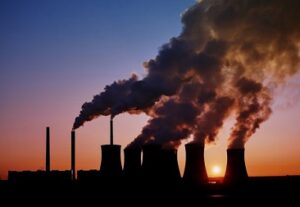
By Oladosu Adenike:
Unconsciously or consciously, in the cause of our daily activities, we inhale polluted air. It is not surprising that new and strange diseases are on an alarming rise, largely air-borne. In the last few months, this part of the world has experienced change in temperature leading to heat wave, it may remain so for the next couple of years if we keep increasing various emissions types that continuously deplete the already fragile ozone layer.
Going by the rate at which emissions are rising, the truth is we have fewer years to act than we think. Air pollution has been recognized as a silent killer, atop contributor to terminal diseases and a leading cause of the climate change crisis now attracting global attention. The rate of death recorded every year arising from air pollution is alarming; 4.2million deaths every year, as a result of exposure to ambient air pollution and 3.8 million deaths as a result of household exposure to smoke from dirty cook stoves and fuels.
This is a call for change in behavioral pattern for the transition to clean energy sources we desire to happen.
AIR QUALITY INDEX-OZONE
AQI
Health Status
301-500
Hazardous
201-300
Very unhealthy
151-200
Unhealthy
101-150
Unhealthy for sensitive group
51-100
Moderate
0-50
Good
Source: Environmental Protection Agency (EPA)
Hazardous is 301 to 500: The entire population is more likely to experience serious health effects and should avoid all outdoor exertion. Very unhealthy is 201 to 300: everyone may experience more serious health effects and should avoid all outdoor exertion. Unhealthy is 151 to 200: everyone may begin to experience some adverse health effects and should limit prolonged outdoor exertion. Unhealthy for sensitive groups is 101 to 150: people with health and long disease, older adults and children are at a greater risk and should limit prolonged outdoor exertion. Moderate is 51 to 100: people who have unique sensitivity to air pollution should consider limiting prolonged outdoor exertion. Good is 0 to 50: no health impacts are expected when air quality is in this range.
This is the globally framework, going by this where does Nigeria stand? Four Nigerian states, Aba, Kaduna, Onitsha and Umuahia have an indication of hazardous air quality between 301 and 500 from the Air Quality Index, this implies that outbreak of disease can spring out from such states with prevalence occurrence of newer diseases among the residence in such areas.
STATE
AQI
HEALTH
PM10
PM2.5
Aba
416
Hazardous
373
49
Abakaliki
168
Unhealthy
88
28
Afikpo
159
Unhealthy
72
25
Enugu
182
Unhealthy
115
15
Ile-Ife
175
Unhealthy
103
26
Kaduna
449
Hazardous
423
90
Nnewi
151
Unhealthy
57
24
Nsukka
183
Unhealthy
117
14
Onitsha
500
Hazardous
594
66
Orlu
142
Unhealthy for sensitive group
52
16
Owerri
208
Very unhealthy
158
44
Umuahia
324
Hazardous
274
40
Note: PM means Particulate Matter, PM10 means ultra-fine particles of 10 micrometer or less in diameter, while PM 2.5 means; ultra-fine particles of 2.5 micrometers or less in diameter.
Source: World Health Organization (WHO)
This table shows that, every breathe contains unhealthy particles and that can shorten the life of a child born today by 20months on an average according to the study on the state of global air. These cities exceed the guideline for PM10 by 37 times, 42times, 59 times and 27 times in Aba, Kaduna, Onitsha and Umuahia respectively. The lives of people living in the highlighted states are greatly endangered as air borne particles can be cancerous to their lung. Little wonder, WHO 2016 Report included Onitsha, Kaduna, Aba and Umuahia among four of the 20 African cities with the worst air quality in the world.
While Owerri, the Capital of Imo State has a very unhealthy air quality, exceeding the PM10 by 15 times. This health situation can have a great impact on the health of the people.
Also, the following cities Abakaliki, Afikpo, Enugu, Ile-Ife, Nnewi and Nsukka are also categorized as cities with unhealthy air quality. People living in these communities are more likely to experience one health issue or the other with high level of vulnerability to diseases likeasthma, heart diseases, especially for sensitive people like children and aged.
This is an indication that there exist air pollution emergencies but yet to be declared and acted upon. From these findings, most states in Nigeria AQI and PM cannot be reached resulting from lack of data collection by appropriate agencies. Hence, the higher the air quality index, the higher the vulnerability of residents’ exposure to various disease. Also, the higher the PM, the greater the risk of people to particles that are cancerous.
Air pollution is a silent killer and a threat to human existence. A 2016 report by World Health Organization posits that “the air people breathe in Nigeria is more likely to cause harm than the air in any other African country because Nigeria currently has the highest (4th globally) in the world with 150 deaths per 100,000 people attributable to pollution.”
Written by OLADOSU ADENIKE (oladosuadenike32@gmail.com).